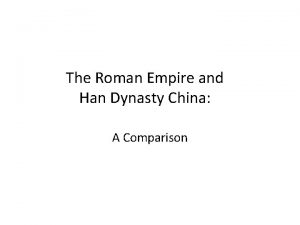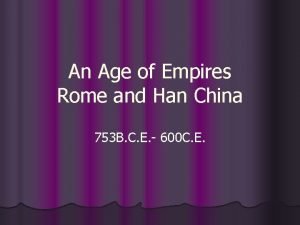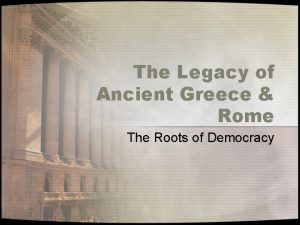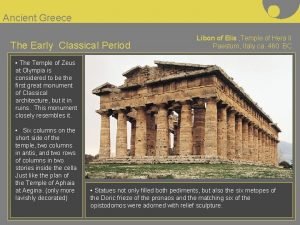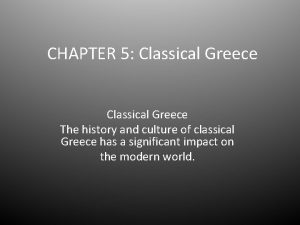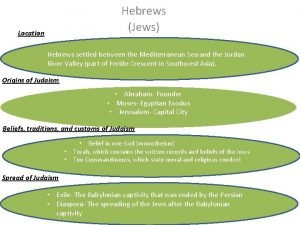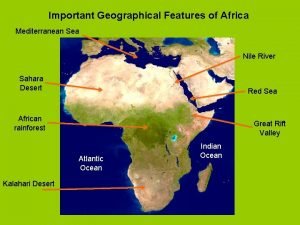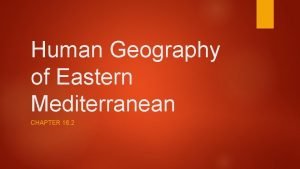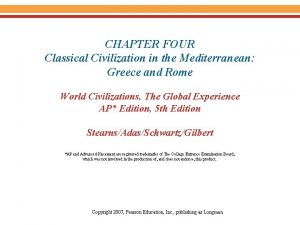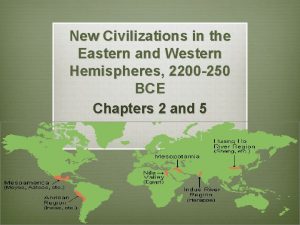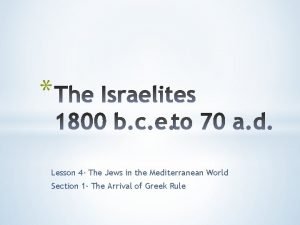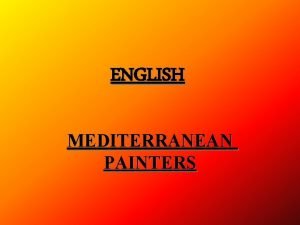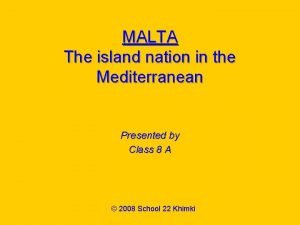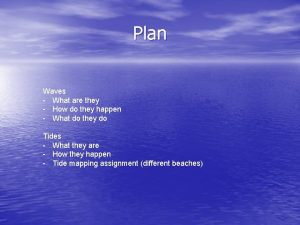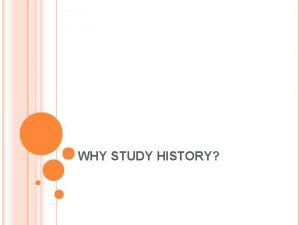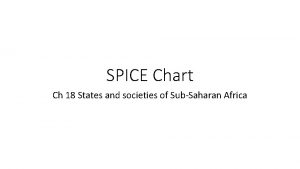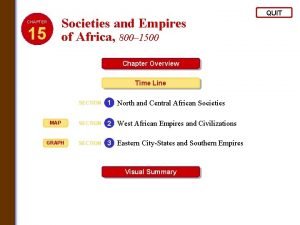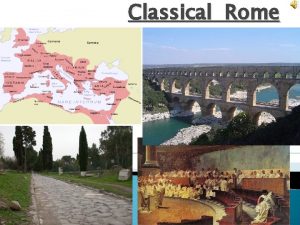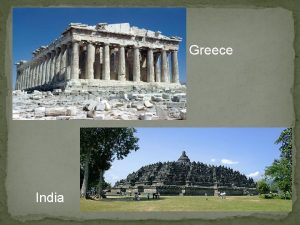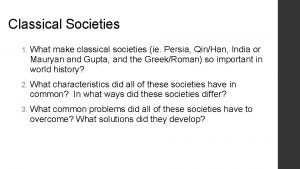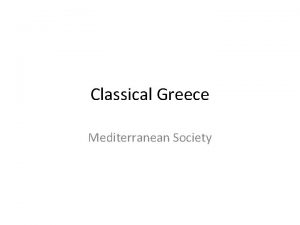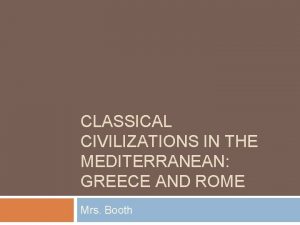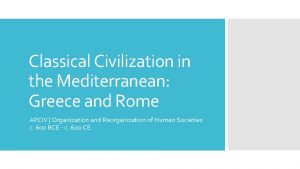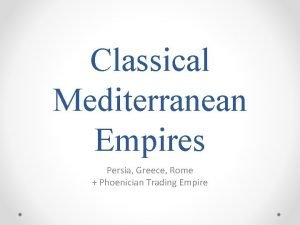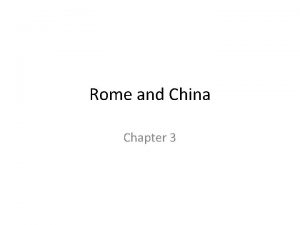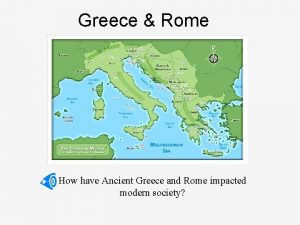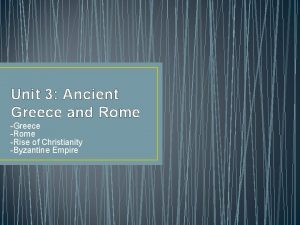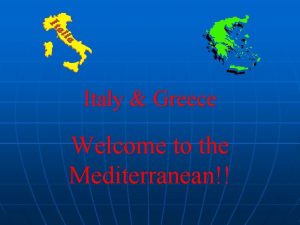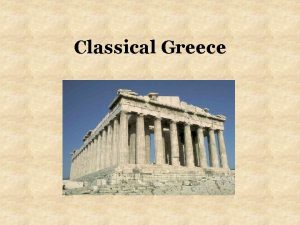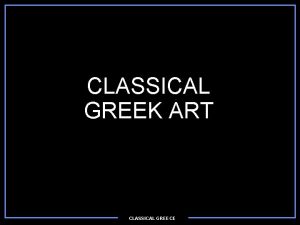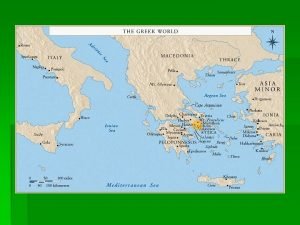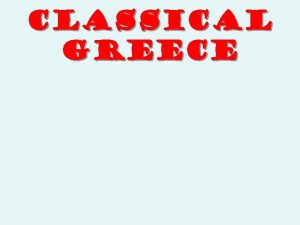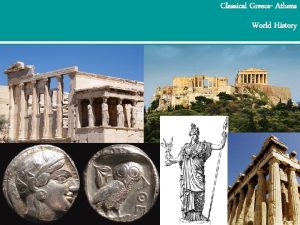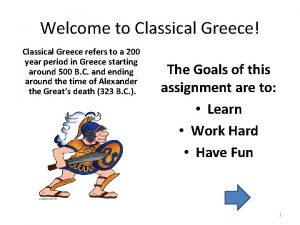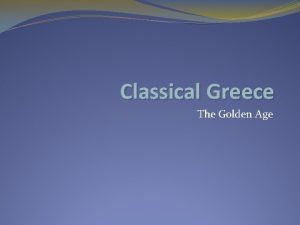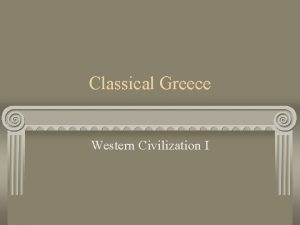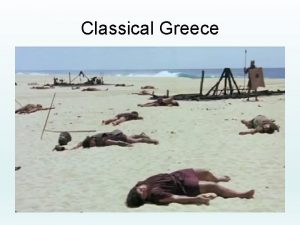Classical Mediterranean Societies Greece and Rome Greece China









































- Slides: 41

Classical Mediterranean Societies

Greece and Rome Greece China Mesopotamia Egypt You are here India

Early Greece • Greek civilization developed along the Balkan peninsula

Early Aegean Civilizations • Early Aegean civilization arose on the island of Crete • We call these people the Minoans, after their legendary king, Minos CRETE

Minoan Civilization • The Minoan Civilization flourished from 2700 B. C. E. - 1450 B. C. E.

Minoan Civilization • Discovered by modern times by Sir Arthur Evans in 1900 • We don’t know much about the Minoans – Why? • Language we don’t understand or read • Relatively new discovery

Minoan Civilization • Language: – Non Indo-European or Greek • Society – Wealthy, but generous to others • Government built houses for poor • Wealth seems to be distributed – Concerned with leisure activities and sports

Minoan Civilization • Government: – “Bureaucratic monarchy” • Trading peoples • Government depended on international trade throughout the Mediterranean – Unconcerned with invasion from other groups • Little military structures were discovered

End of Minoan Civilization • Archaeological evidence shows us that the palaces of Crete were destroyed by a series of great earthquakes and volcanoes

Mycenaean Civilization • Group of peoples from central Asia who entered the Balkan peninsula around 2000 B. C. E. • Divided present-day Greece into a number of kingdoms, each centered around a capital city

Mycenaean Civilization • The Mycenaeans eventually conquered the Minoans • They adopted much of Minoan culture • Most famous Mycenaean story/man: – The Iliad – Agamemnon

Mycenaean Civilization • Cities were built on hilltops – Royal fortress built on top of hill – City walls surrounded the hill – Most people lived outside the walls and entered on a daily basis to do business – Served as protection in case of attack

Fall of the Mycenaean Civilization • The Mycenaeans were eventually defeated by the Dorians – Dorians invaded from the north – Used iron weapons to defeat the bronze weapons of the Mycenaeans

Dorian Civilization • The Dorians ruled all of Greece from 1100 to around 750 B. C. E. • The period of Dorian rule has traditionally been called the Greek “Dark Age” – Why was it a Dark Age?

Dorian “Dark Age” • Overseas trade stopped • Poverty increased • Stopped writing – Traditions and stories were maintained by bards (traveling storytellers) • Thousands left mainland Greece and settled in Ionia (present day Turkey)

Ionian Restoration • The Ionians eventually overcame the Dorians and “culture” returned

What is a Polis? Polis: Ancient Greek city-state

Origin of the Polis • By the 8 th century B. C. , cities began to develop into citystates • City state: a state consisting of a city and the surrounding territory that operates like its own country.

Origin of Polis • A polis is a Greek city-state, and these developed around the same time • Governments of each Greek polis were unique to their city – Athens – democratic – Megara – despotic – Sparta– oligarchic

Common Characteristics of Greek Poleis • Acropolis: – Fortress on top of a hill – Site of temple – Center of city • Agora: – Public square – Sat at foot of acropolis – Site of business transactions and political affairs

A Greek Polis

The Two Great Poleis: Sparta and Athens

Sparta • Located on the Peloponnesian peninsula

Sparta • Government: (developed by Lycurgus) – Two kings (called basileis) • Did not rule in traditional sense, but were basically nobles with special privileges • Held power to declare war – Council of Elders (called gerousia) • 28 men plus 2 kings • Requirements: Spartan men over 60 • Could veto assembly, replace a king, and acted as a court

Sparta • Government: – Assembly of Citizens (called apella) • All Spartan men over 30 • Elected members of Council of Elders and five Ephors • Approved or denied decisions by Council of Elders and Ephors – Ephors • 5 men • Much power – (basically governed day to day life in Sparta)

• Society Sparta – 3 Levels • Top - Spartans (Spartiates) – Citizens, had to undergo formal military training – Descended from original inhabitants of Sparta – Military group – did not perform other tasks • Middle – perioeci – Free, but not citizens – No political power, but conducted trade for Spartans • Bottom – helots – Slaves – No rights, worked the land performed other labors

Sparta • Education/Military Training – All Spartan male citizens were required to become soldiers • Birth to age 7: all children raised by mother • Age 7: male children taken from their homes; all live in barracks and are organized into groups of 60; children play games, learn about Spartan customs, and learn how to survive • Age 12: each student received an older Spartan soldier as a mentor; continue to live in barracks

Sparta • Education/Military Training • Age 20: Allowed to marry, but lived in barracks • Age 30: Became member of Assembly, allowed to live at home • Age 60: Retired from army, eligible to be elected member of Council of Elders

Sparta • Status of Women – More free than in other parts of Greece • Could own property, move about the city, etc. • Could not participate in politics – Married later (19 as opposed to 14) – Received an education and physical training – Were expected to manage husband’s affairs during war

Athens • Located on the Attica Peninsula

Athens • Government – Development Monarchy Oligarchy Limited Democracy

• Reformers Athens – Draco – first written law code – Solon – cancels debts, moves Athens towards democracy – Peisistratus – divided land, gave citizenship to landless peasants, public works program – Cleisthenes – broke power of aristocracy, increased power of the Assembly

Athens • Government – Council of 500 • Chosen by lottery amongst all citizens • Carried out work of the government • Other – Ostracism – citizens write names of unwanted persons who would be expelled after 6, 000 votes – Jury System – 201 to 1, 001 members

Athens • Education – Focused on the arts and philosophy – From age 7 to age 14 • Privatized – parents had to pay – Studied grammar, arithmetic, geometry, music and gymnastics, the Iliad and Odyssey – 2 years of military training at age 18

Sparta v. Athens • Sparta – – Peloponnesus Oligarchic gov’t Warrior state Population in 430 B. C. • 100, 000 – Strong Army – Militaristic Society • Athens – – Attica Democratic gov’t Trading state Population in 430 B. C. • 140, 000 – Strong Navy – Emphasis on Culture

Greek Culture • Poetry – Homer: The believed author of the Iliad and the Odyssey - two of the most famous Greek epic poems. Not much is known about him. • Iliad: this is set during the 10 year Trojan War between the Trojans and a group of ancient Greek kingdoms. It mostly takes place during the last year of the war. • Odyssey: This poem follows the hero Odysseus’ ten year journey home after the fall of Troy.

Greek Culture • Philosophy – Socratic School • Socrates (469 B. C. E. – 399 B. C. E. ) – – Wrote nothing of his own Taught by questioning his followers Believed in absolute Truth Virtue of the unexamined life – questioning of everything? » Is this correct? – Convicted of corrupting the youth of Athens and sentenced to death; drank hemlock to commit suicide

Greek Culture • Philosophy – Socratic School • Plato – Taught at the Academy – Appearances are deceiving, only through search for truth can you find it – Major Works: » Apology – Socrates’ defense at his trial » Crito – Justice v. Injustice » Phaedo – death of Socrates; question of eternal life » Republic – philosophical look at government; best is by the learned

Greek Culture • Philosophy – Socratic School • Aristotle – Taught at the Lyceum – Taught about the importance of logic – Major Works: » Physics – earth as center of solar system; observed information and classified by similarities/differences » Politics – practical look @ politics; perfect system put power in middle class & combined all types of gov’t

Greek Culture • Philosophy –S ocrates – absolute truth Taught –P lato – appearances are deceiving Taught –A ristotle – trust logic

Greek Culture • Scientists – Mathematicians • Pythagoras – Pythagorean Theorem – Medicine • Hippocrates – “Father of Medicine” – Disease had natural causes – Advocate of hygiene – Hippocratic Oath
 Roman china
Roman china Rome and han china
Rome and han china What is a myth
What is a myth The glory that was greece, and the grandeur that was rome
The glory that was greece, and the grandeur that was rome Spartans physical education
Spartans physical education The legacy of ancient greece and rome
The legacy of ancient greece and rome Babylon medo-persia greece rome timeline
Babylon medo-persia greece rome timeline Classical period greece
Classical period greece Lesson 3 classical greece
Lesson 3 classical greece Chapter 5 classical greece
Chapter 5 classical greece Hebrews location
Hebrews location Unit 2 the united states and canada
Unit 2 the united states and canada Mediterranean diet pyramid oldways
Mediterranean diet pyramid oldways Make everyday mediterranean
Make everyday mediterranean Africa mediterranean
Africa mediterranean Chapter 16 eastern mediterranean answers
Chapter 16 eastern mediterranean answers Storms in the mediterranean sea
Storms in the mediterranean sea What is dash diet definition
What is dash diet definition Greek colonies in the mediterranean
Greek colonies in the mediterranean Ancel keys mediterranean diet
Ancel keys mediterranean diet Mediterranean civilizations location hemisphere
Mediterranean civilizations location hemisphere Mediterranean shipping cruises
Mediterranean shipping cruises Chapter 13 section 1 mediterranean europe
Chapter 13 section 1 mediterranean europe What was life like for the jews in greek ruled lands
What was life like for the jews in greek ruled lands Function of lenticels
Function of lenticels Mediterranean diet pesticides
Mediterranean diet pesticides Bioluminescence mediterranean sea
Bioluminescence mediterranean sea Veronica v picasso biografia
Veronica v picasso biografia Mediterranean sea map
Mediterranean sea map Danube mediterranean canal
Danube mediterranean canal General fisheries commission for the mediterranean
General fisheries commission for the mediterranean Mediterranean island nation
Mediterranean island nation Car gurtus
Car gurtus Anatomy of a wave
Anatomy of a wave Mediterranean solar plan
Mediterranean solar plan It helps us understand people and society
It helps us understand people and society North and central african societies
North and central african societies Balance sheet for clubs and societies
Balance sheet for clubs and societies Great zimbabwe spice chart
Great zimbabwe spice chart Difference between credit union and building society
Difference between credit union and building society Ib environmental systems
Ib environmental systems Chapter 15 societies and empires of africa
Chapter 15 societies and empires of africa
